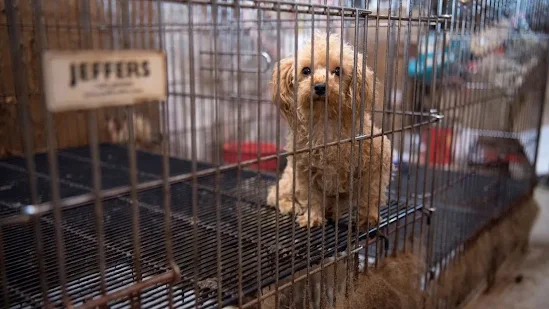Entirely understandably, American's pet store owners, take a commercial stance when running their business. They have to in order to make a profit. The world is highly competitive. But my argument is that they need to temper that objective with the objective to ensure that they run their businesses along ethical lines.
 |
| Inherently unhealthy bulldog for sale at Perfect Pets. Image in public domain. |
And I'm referring to the acquisition of cats and dogs from puppy mills to supply their pet stores. No doubt these animals are quite cheap because they are bred in a cheap fashion. They are bred in facilities where there is poor regard to healthcare and socialisation normally. I don't want to brand all puppy mills with the same criticism but they are called "puppy mills" for a reason. They churn out puppies which means the pet stores can buy them cheaply.
It also means that the puppies are going to be popular breeds such as dachshunds and French bulldogs. But both of these dog breeds have health problems particularly the French bulldog which I think is the unhealthiest dog breed of them all with a reduced lifespan as a consequence.
RELATED: 21 genetic diseases inherited by the French bulldog. Are they always in pain?
The moral aspect of acquiring cats and dogs from puppy mills is this. They should be selling rescue dogs and cats from local animal shelters because in that way they will save the lives of some animals scheduled for euthanasia because the shelters are oversubscribed. Sometimes there is not enough space for incoming unwanted animals.
And when an animal shelter does not run a no-kill policy with commitment, you get a situation where you have to euthanise healthy animals. Nathan Winograd would argue that if you run a proper no-kill policy there is hardly ever if ever a need to euthanise healthy animals. But it does require a huge amount of commitment and a smart approach to running a shelter.
RELATED: Pet stores in America are unfeasible unless they buy from puppy mills.
Back to the moral point. In Aurora city the council has passed an ordinance to ban the sale of cats and dogs that have been commercially-bred at puppy mills. Pet stores are going to have to sell rescue animals acquired from animal shelters.
And, as expected, the pet store owners are up in arms. They think the decision by the city's administrators is entirely wrong. They state that many pet store owners are good people running good stores and are not evil and overly commercial in disregarding animal welfare.
I get that. But the moral dimension is still there for all to see. It doesn't matter if the pet store is run really well if they are stocking the outlet with puppy mill cats and dogs. That's because in doing so, as mentioned, they are indirectly encouraging the killing of healthy animals are animal shelters, which is unsupportable.
And it is interesting to note that one pet store owner, Jens Larsen of Denver Perfect Pets in Centennial says that the decision to ban the sale of puppy mill dogs and cats as "wrongheaded". He's outspoken but he should keep his head below the parapet - see below.
He said that not all people are evil or wrong that run pet stores. Correct. And he adds that he has never had any violations or citations against him. He says that puppy mills are often licensed and regulated and therefore to ban supply from these facilities to pet stores as "just wrong".
In some ways he is correct but I have to stress once again the moral dimension. The ethics of the current situation in which puppy mills supply pet stores is unsustainable.
Jen Larsen's Perfect Pets
And interestingly, if you go onto the yelp.com website you see that his outlet has two stars out of five from 69 reviews. That definitely points to a problem and if you dig around further you will find a news media story on the Denver 7 ABC website with the headline, "Centennial pet shop accused of selling sick dogs to customers". That is a reference to Jen Larsen's pet store.
Some customers are accusing him of selling sick animals. One of them was a dachshund who was bought by a couple and they said that they "went to bed thinking I might wake up to a dead dog. So how could that get any worse?" Just days after bringing her dog home she said that he flopped and rolled and couldn't stand up on his own.
The dog had giardia, a protozoan parasite that most dogs contract from drinking faeces-contaminated water. The condition was not covered by Perfect Pets' insurance. They took the dog to a veterinarian, one that was not suggested by Larsen. As it happens, Larsen partly paid for the veterinary treatment. The dog needed oxygen but survived.
Denver 7 went to check out Perfect Pets with an undercover camera and noticed lethargic dogs and one that had mucus running out of their nose. An employee said that the place was too dusty. But the point here is that Larsen has been accused of selling sick pets and he is the one who is vociferously against the Aurora city ordinance banning the purchase of puppy mill cats and dogs.
And that's the point of this article. Business people owning pet store outlets need to balance the objectives of being ethical and of making a profit. The former puts a check on the latter and the former should underpin all their activities. In doing so, they will run a better business and it will be more profitable in the long run.










